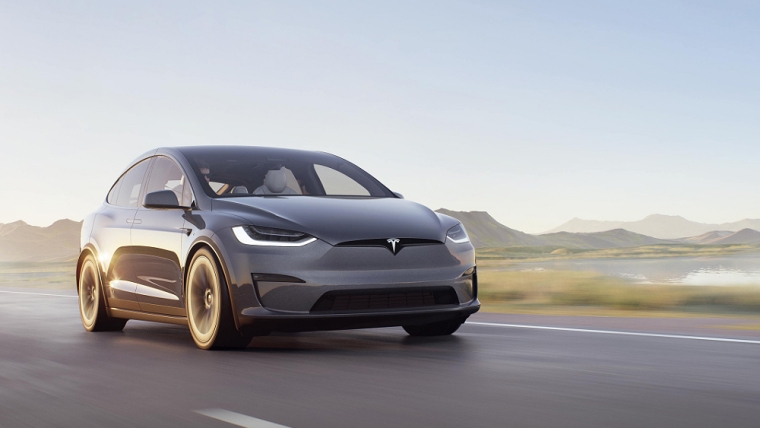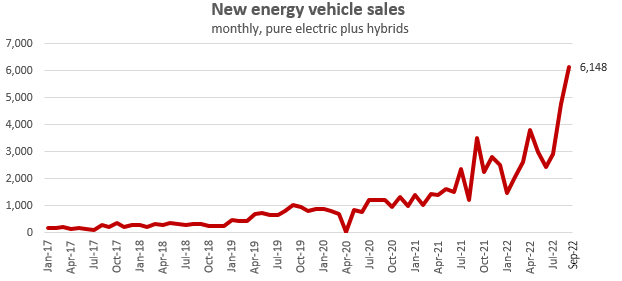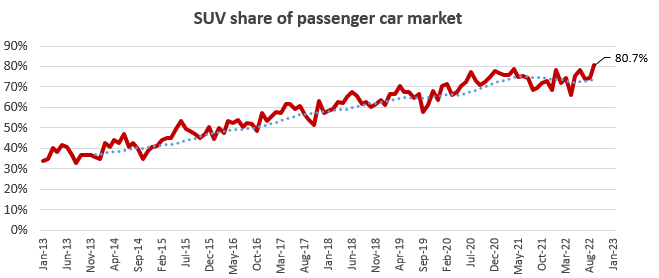
The Clean Car discounts have twisted the new car market sharply and the twist is getting very significant.
A flood of arriving Tesla's has pushed the number of new energy vehicles sold in September to over 6,000. New energy vehicles include pure electric cars, plug-in petrol hybrids and the more traditional petrol hybrids.
Almost 60% of all passenger cars sold in September were NEVs. This is a segment growing quickly even as overall passenger car sales are not. There were 17,978 total passenger cars sold in the month, 10,586 new and 7392 used imports. Overall both were lower than September a year ago, and for new cars, more than 11% lower.
Apart from the well-healed, higher interest rates, high fuel prices, and the Clean Car Discount scheme are discouraging most households from purchasing new vehicles.

Despite the overall fall, sales of SUV's rose and this was led by sales of medium and large SUVs. In fact, for the first time ever, more than 80% of all passenger car sales were the SUV style.

New vehicles sold
Select chart tabs
37 Comments
Wow, more than half of all new cars sold in September were New Energy Vehicles, that's amazing! I would imagine that would make NZ a leader in the uptake of NEV's, is there another country that has a higher uptake that 60% of NEV vehicles?
Norway, for one:
In 2021, about 86 percent of all cars sold in Norway were electric cars, including battery-electric vehicles (BEV) and plug-in hybrid electric vehicles (PHEV). This share represents a sharp increase compared to the pre-pandemic EV sales share, which stood at 56 percent in 2019.
Source: https://www.statista.com/statistics/1029909/market-share-of-electric-ca…
Thanks for the info, still I imagine 60% is very high internationally. I spent 5 weeks in Europe this winter and I was disappointed to see much fewer EV's in most countries, compared to NZ (I like cars)
A problem for many of us is that own ICE (petrol/diesel) vehicles won't be worth too much when it comes to trading in.
Further, I'm told that brand new ICE vehicles are becoming tougher for dealers to shift...... The sunny side of this is that there are now signs of aggressive discounting.
Hang on until early-2023 and you might save yourself a bundle of cash.
TTP
You see a lot in the central cities in Europe and less and less further out you get.. the relative wealth is still a clear element on purchasing.
Norway - world leaders in EV uptake, they can afford to be because they successfully mined all the oil out of the North Sea. Well played, I think? So confusing...
Would this be the Model Y preorders being filled? Also, a certain bank's low-rate environmental loan product for solar, EVs that has recently been launched could be a factor.
Of the 10603 New (not used) passenger car registrations, almost 15% were Teslas (and almost all of those were Model Ys as the last shipment didn't have any 3s in it). They are becoming as common as Corollas. And they were a whisker under 2/3rds of all new full BEVs.
Probably not going to be like this every month though. Twas a big surge of Ys.
Indeed, More EVs registered in Q3 than Q1 and Q2 combined.
The next shipment is all Model 3s apparently. The Website still says est delivery for a new order model 3 is Feb/mar 2023 so still some backlog to clear, But for the Y it is Nov/Dec2022 so basically they have cleared the backlog already.
Might even be able to buy direct off the showroom floor/website for immediate delivery in Early 2023.
BYD for EV numbers will kick in shortly here in NZ...their order numbers here are large and as a battery maker supply is not an issue, they may well match Tesla numbers before end of year. Tesla may be the iphone of style in Evs however BYD will take the market on price point. Also more conventional controls will appear to an older audience. Screen blinks on a Tesla .. no way you can drive the sucker...
Not true, none of the bare minimum functional controls on a tesla are on screen. A broken screen wouldn't stop me driving, but it would be bloody annoying till it got replaced under warranty , would have to drive the aircon and media from voice commands which are hilariously bad with NZ accents. I think i'd end up using my phone for most of it.
Short trips under 2km make up nearly a-third of all car trips in NZ, totaling more than a billion car trips each year or 12 short trips per household per week.
Such trips on ICEs produce a higher rate of carbon emissions per kilometre as cold engines use 40% more fuel over the short trip, and increase engine wear and tear.
Good to see more NEVs coming on our roads.
Whenever people whinge about fuel being too expensive I just look at data such as this and the amount of big cars with one person and think.....nope, its way too cheap.
For most people, their commute is fairly short so the fuel price doesn't really make a huge difference.
Electric cars are good but most people use them for short trips. Some of those trips could easily be done by walking etc. The theory goes: my electric car cost me heaps but the electricity cost is low. So i'll use it! Their health will suffer.
There would be a huge leap to get them out of their cars and onto a pushbike, electric bike, scooter etc. Safety would be No.1. I know I used to commute by bike and had a close call most days. I am lucky to be alive today.
But there are other hurdles such as having to have a shower at work on wet or humid days. So you have to have dry clothes wrapped up in your bag of left at work. Punctures happen from time to time. Slippery Council wooden bridges. Puddles splashing water everywhere. The list goes on.
Been there done that. Commuted by bike all my life until i started the WFH gig. Now have to make a conscious effort to exercise everyday.
Cycling to school and then work for 40 odd years set up up for the good later life health I have now I'm sure.
The daily car commute by car must be one of the most dreadful experiences and time wasting activities I could ever imagine - yet so many do it. Indoctrinated fools I say.
Yea I probably wouldn't project my ability to work where and when I want across an entire population before I go calling other people 'indoctrinated fools' but you do you.
I reckon the fools are probably the ones who don't realise not everyone can control where or when they work to the extent that WFH or alternatives to driving are viable options and then use that as an excuse to look down their noses at everyone, totally blind to their own privilege. But that's just, like, my opinion man.
Basically you need a totally dedicated cycle way so it's not possible to be hit by a car or bus. Progress from there would be for it to be under cover. If you try and cycle to work in Auckland it's pure suicide been there done that. Just not he same anymore used to cycle to school no problem but drivers have changed.
Agree, cycling may never really take off in Auckland. I used to cycle from Sandringham to the CBD but you have to be very fit, as much of Auckland is horribly hilly - it doesn't seem that way when you drive, but you quickly notice it on a bike!
Also you need storage and showering facilities at work, which I imagine many offices don't have. I used to keep my suit at work, and showered and changed when I arrived - soaked through from rain, or sweat, or both.
Electric bikes have helped with the hills, but there's still physical effort needed - and let's be honest, for at least 8 months of the year Auckland's weather is cold, wet, and windy. Only a tiny percentage of Aucklanders will ever make use of the costly cycleways (which come at the expense of lanes, and parking).
And of course cycling is dangerous, as the number of cars increases and driving skills decrease.
Aucklands weather is perfect for cycling. Get a bike with mudguards so you don't get wet from puddles. The chance of it raining during the actual ride is about 10 times per year. Get changed at the other end or take the bus or car that day.
Perfect? You're dreaming. Sure it doesn't snow, but it rains way too much (+ wind) to be anything like perfect.
Same here in Chch.
I e-bike daily (maybe to atone for my sins of having a big petrol 4x4, which is hardly used ... I can't make the numbers work on buying an EV).
I will gladly bike anywhere where there are dedicated cycle lanes, or if I only have to go down quiet suburban streets. However, outside of the enclave of the cycle lane it's just too dangerous, particularly during peak commuting times.
The gym I attend is ~7km from my house, and the whole ride takes me 20 minutes each way on my eBike. All of it is on a separated cycleway apart from one part right at the end where the cycleway ends and you merge into a busy road/intersection.
Guess which part of the road I've had several near misses in the last month alone, as motorists just filter left across the end of the dedicated cycleway and through the "shared" path that is painted on the road.
I vastly prefer cycling to driving as it is so much quicker for shorter distances, and I never pay for parking any more. But every time I stray off the dedicated cycleways I'm reminded why so many people are averse to biking.
We have got our family car usage down to 6000km/year and could probably get it lower still. I e-bike to work so we only have one car (a used Leaf). Even, with these low kms, the used EV costs the same to run as petrol car costing $15k less.
Financially, the e-bike has paid for itself many times over - the total cost of biking over 5 years (including buying the bike) is less than one year of car costs. Time wise, it is 50% faster than sitting in the car traffic.
I have had 3 incidents with cars in that time - all caused by cars not looking. 2 were minor where and 1 was major which saw the driver found guilty of dangerous driving thanks to the witnesses who saw it. This last one kept me off my bike for a few months. I ride very defensively as I expect drivers to do stupid things and because they forget that cyclists exist (despite passing one only seconds earlier). For NZ drivers, the only thing that would change behaviour is a change to the law in terms of driver liability (as per the Netherlands).
How the hell does an EV cost as much to run as an ICE? Even if I base my per km cost on the most expensive fast charger I know of (82c/kwh) and totally load the dice in the ICEs favour by assumming all kms are open road at 17km/L, I can only get to about 2/3rd the per km cost of fuel alone on my old ICE.
Unless you are doing a whole lot less kms and including insurance and depreciation on a much more expensive vehicle as "running costs"?
Depreciation and not running high enough kms .. hard to make it work personally on the dollars....and yes depreciation & insurance should be factored in as cost of ownership.
They are not a running cost, they are an ownership cost, they cost almost the same if the car sits in the garage and never moves (slightly less depreciation due to not clocking up kms).
Insurance on $20k car wont be that much higher than on a $4000 banger, most of the insurance risk in both will be the risk of having to pay out if you t-bone a new Bentley.
Yes, total cost of ownership. A $30k EV will cost you the same as a $15k ICE - the EV’s high depreciation and low operational cost balances the ICE’s lower depreciation and higher operational cost.
Only if you do very low kms. At that point you might want to just uber instead of owning a vehicle.
<5c/km for "fuel" and no servicing requirements beyond tyres and wiper blades is a huge saving. Paid just under $1000 for a service and rear brakes on my partners Nissan at 100k km.
Yeah, I live within 100m of an intersection on a long suburban street, and when I hear ICE vehicles coming from that intersection with their foot hard down on the gas it just reinforces to me that yes, gas is still too cheap.
It's the same with all the juvenile teens who gather together for burnouts etc, yet another indicator that gas is still too cheap.
I dread the day when these idiots are in EVs, and you can't then hear them coming, foot to the floor.
Some good stats there and valid discussion.
There are also 5,500 double cab Ranger utes on back order with 2,500 being the v6 model. No clean car discount on those 5,500 utes.
Agree in town running should be an EV or at the least a hybrid.
My view is that most New Zealand families do not have spare cash to upgrade a vehicle to an EV just yet.
The market maybe polarised on this one just now.
Yes. But in a few years time these will be available on the used market where most people buy.
I think we'll see a lot of depreciation on these new EVs. Once warranties run out the risk on batteries will be a major factor considering the replacement cost if you do get landed with something close to failure. Businesses will be able to claim depreciation however private owners will feel it in their pocket, especially if they've put it on the house.
Second hand tradie Ute market is dead. Discounts coming as dealers are stuck...some close to the wall.
Great to see, and we can assume that some of these cars will start to flow into the second-hand market over the next few years.
My tips for people getting onto the bike for a commute: avoid wearing sunglasses. A bit of eye contact can be a life saver.

We welcome your comments below. If you are not already registered, please register to comment
Remember we welcome robust, respectful and insightful debate. We don't welcome abusive or defamatory comments and will de-register those repeatedly making such comments. Our current comment policy is here.